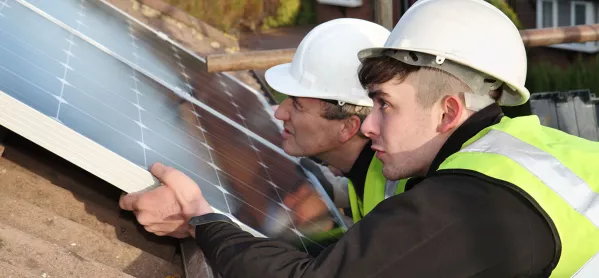Why we must value and promote work experience

As a school that has long had a focus on the importance of work experience, it was dispiriting - although perhaps not surprising - to see a report on Tes this week that 50 per cent of state school students are missing out on opportunities to gain meaningful experience in the workplace.
After all, with school budgets under increasing pressure, it is more difficult for schools to allocate time and resources to sourcing work experience opportunities, often relying on informal networks and parents to support sources with securing access to the workplace.
Yet, exposure to working professionals, industry partnerships and volunteering, alongside traditional work experience, are all vital ways to ensure students from all backgrounds have their eyes opened to new career ideas and networking connections that can open up future opportunities.
One way we have tried to do this in our school is with our Gropius Lectures series, where we invited professionals, many of whom are parents of students, from different sectors to attend the college to deliver a talk on their job role and career pathway and answer student questions.
This helps give our students valuable insight into prospective careers they might not know exist. Previous speakers include a haematologist, software engineer, lawyer and CEOs. College alumni are also invited to give talks to our students about their career pathways.
Power of local partnerships
The power of partnerships is another key way to boost work experience opportunities, and we draw on both industry and community interest companies to ensure our students have access to meaningful experiences in the workplace.
In our sixth form, for example, students benefit from our long-standing partnerships with Addenbrooke’s Hospital and Royal Papworth Hospital, which enables them to apply their knowledge in a practical environment.
Proactively asking your students about their interests and aspirations during one-to-one meetings, tutor time and surveys will enable you to focus your efforts on developing a programme of experiences that meets their needs where possible.
Dedicated careers staff
At the college, we have a full-time careers lead, who is an experienced and non-teaching member of staff. Not only does she have a lot of connections that we can utilise, but she can dedicate more time to engaging with stakeholders in the area to effectively develop partnerships than our teachers.
However, we do leverage our teachers’ industry expertise and relationships to establish partnerships with local companies.
We also make sure all our sixth-form students benefit from work experience, while our Year 10 students can choose between formal work experience or volunteering through the Duke of Edinburgh’s Award.
Working with local organisation Form the Future has enabled us to extend the range of opportunities available to our students outside of their parents and connect them to the world of work.
More than 100 of our main college students now volunteer regularly in the local community through our partnerships with schools, nursing homes and other community organisations.
Student volunteering
As an International Baccalaureate World School, we also ensure all students undertake service learning as a mandatory component of learning and we have seen huge benefits as a result.
Not only do they develop important life skills such as communication, teamwork and leadership, but we see tremendous increases in self-confidence, too.
While volunteering is not work experience, it does provide an extended opportunity for students to develop the same skills that work experience offers. Through careful timetabling, we can offer all of our students access to volunteer opportunities, many of which align with their studies or career pathways.
Some of our environmental systems and societies students have volunteered with a local conservation project, while students with teaching aspirations can volunteer in one of the local schools in our trust.
Through our teachers’ connections with schools across the world, we have also been able to offer our students volunteering opportunities for teaching at schools in India and Peru.
Ultimately, leveraging your local network of organisations and charities, embedding work and volunteering opportunities into the timetable, and collaborating with parents means schools can ensure that students enjoy the advantages of work experience, regardless of their background.
This can only stand them in good stead for their future lives.
Victoria Hearn is principal at Impington Village College near Cambridge
For the latest education news and analysis delivered directly to your inbox every weekday morning, sign up to the Tes Daily newsletter
Keep reading for just £1 per month
You've reached your limit of free articles this month. Subscribe for £1 per month for three months and get:
- Unlimited access to all Tes magazine content
- Exclusive subscriber-only stories
- Award-winning email newsletters
topics in this article



